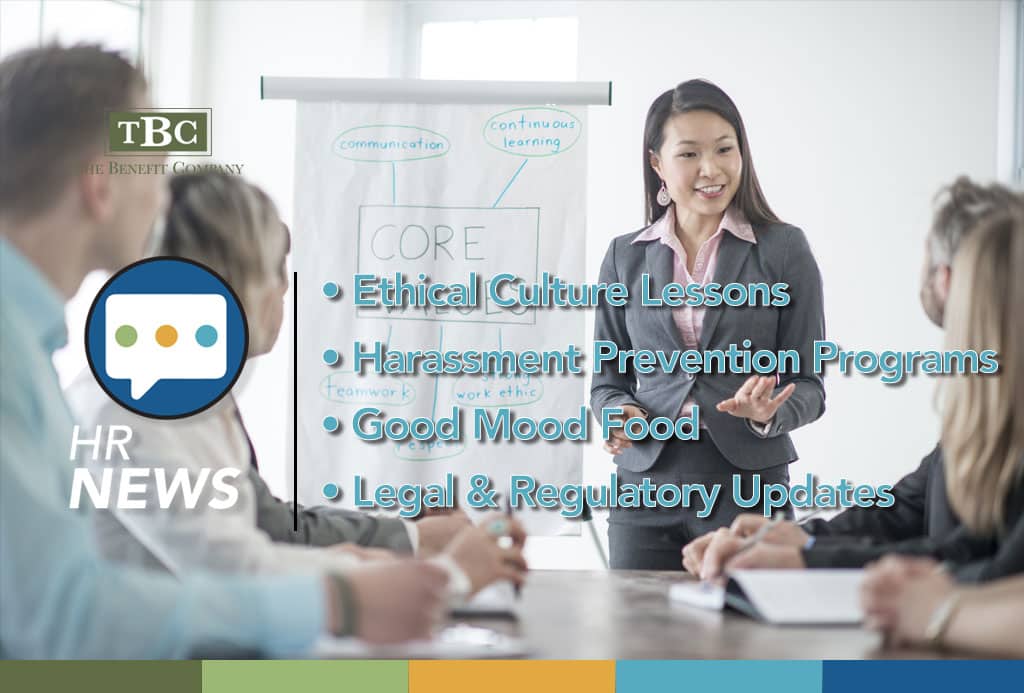Legal Updates and Reminders:
- May 17, 2018: The South Carolina Pregnancy Accommodations Act was signed into law. This law amends the SC Human Affairs Law, and requires SC employers with 15 or more employees to make facilities readily accessible for and provide reasonable accommodations to employees with “medical needs arising from pregnancy, childbirth, or related medical conditions,” including lactation. It also requires employers to provide written notice of its protections and post information in conspicuous areas. Effective now, written notice must be provided to new employees at the start of their employment, and to current employees on or before September 14, 2018.
- May 8, 2018: GA Governor Nathan Deal signed legislation amending the maximum part of disposable earnings subject to garnishment, as follows: The amount exceeding weekly earnings of $217.50; in the case of earnings for a period of other than a week, the proportionate fraction or multiple of 30 hours per week at $7.25 per hour. This was effective the day it was signed.
- May 3, 2018: GA Governor Nathan Deal signed legislation permitting drug testing of all forms of opioids for state employment. This is effective July 1, 2018.
- May 2, 2018: GA Governor Nathan Deal signed legislation joining 15 other states with a total ban on hand-held (or supported by any part of the body) cellphones or other wireless communications devices or stand-alone electronic devices while driving, or while stopped at a stop sign or at a stop light. Details are available online at headsupgeorgia.com. This law is effective July 1, 2018.
Ethical Culture Lessons for CEOs
Shortly after Pope Francis assumed his new job as CEO of the Catholic Church, I read a very interesting article summarizing what we were seeing on the news regarding the very different approach the new Pope was making in his everyday life as compared to his predecessors. You may remember that he chose to live in a simple 2-room apartment rather than in the Vatican penthouse; he made his own phone calls; he took taxis around Rome, rather than using a luxury sedan at his disposal; and moments after he stood on the balcony of St. Peter’s Basilica after the white smoke had cleared, he took the bus home.
Five years or so have passed since the Pope assumed his new role, and he probably isn’t able anymore to be so relaxed in his movement. But, I was very impressed that his actions seemed to demonstrate some key points about leadership, and about setting a positive tone for his ‘team’ to follow. Some of the lessons that might be worth sharing with your CEO include:
- Rather than talk about being a change agent or what you are going to do, just DO IT! The Pope didn’t send out a memo or have a press conference to say he was going to take a taxi, he just did it and others noticed. His Cardinals started doing the same.
- Ordinary acts can have a big impact on your organization, because they are relatable. Your CEO (or other senior staff members) sitting down with employees in the break room to have a cup of coffee and a casual chat can be a huge morale booster in many organizations. And, your CEO might learn some things first hand that are good for him to know!
- Nothing destroys the credibility of an organization better than hypocrisy at the top. When you roll out your Code of Conduct & Ethics training, be sure your CEO supports it and isn’t the one you need to counsel to stop hugging the young women in the office. Live the rules you want others to follow.
- Be aware of the impact of symbolism. In a year when pay increases are not given or some jobs are eliminated due to cost, perhaps best not to have your company’s Board of Directors meeting at a posh resort.
- Be mindful of being watched. Your employees are watching your every move, and these days, are likely reporting about it on social media. Be consistent and thoughtful in your actions, and insist that your top management team is as well.
CEOs have a lot on their minds and lot on their plates. Sometimes a gentle nudge (hopefully not a kick) from us in HR can help them see themselves and their company more through the eyes of their employees.
Harassment Prevention ‘Core Principles’
We don’t want to think that actions within our company could lead us to be the target of an EEOC investigation, but it can happen. If it does, we want to be sure our company is in the best position to defend itself. For starters, be sure that the EEOC’s five stated ‘Core Principles’ in a harassment prevention program are in place. Remember, even without the charging party’s interest in pursuing an EEOC case after filing a claim, once it is filed, the EEOC can forge ahead and investigate it anyway. Having the following five principles in place in your harassment prevention program will be areas you will want to highlight in your response to a charge, if you receive one.
- Committed and engaged leadership
- Consider having your senior leader open your harassment prevention training, in person or by video if your company is very large
- Post a statement from your CEO showing support for the company’s anti-harassment policy
- Consistent and demonstrated accountability
- Consider having a performance objective in management employees’ annual review, ensuring accountability on harassment prevention. For example, if a manager hears of harassment and fails to report it to HR for review and potential investigation he or she may be penalized at merit increase time.
- Strong and comprehensive harassment policies
- Anti-harassment policies must clearly explain prohibited conduct, and provide a flexible complaint procedure allowing employees to bring a complaint to HR, rather than only through their own management chain.
- Trusted and accessible complaint procedures
- HR and labor relations personnel should have investigation training. Do not leave an important harassment investigation in the hands of someone who really does not know what they are doing.
- Regular, interactive training tailored to the audience and the organization
- Consider having anti-harassment training as part of new hire orientation for employees at all levels in your company, distribute your written anti-harassment policy to new hires, and have employees sign an acknowledgement of receipt. Consider having periodic training for all levels of employees: face to face, online or via written communication.
The EEOC has communicated to employers what they should be doing to help prevent harassment. Smart employers will pay attention to what they hear.
Good Mood Food
According to a large-scale study reported in the American Journal of Public Health, eating fruits and vegetables has a significant added benefit of boosting happiness! Individuals who went from eating no fruits and vegetables to eating eight portions a day saw the most significant benefit: experiencing an increase in life satisfaction equivalent to moving from unemployment to employment.
In addition, a study from the Johns Hopkins Bloomberg School of Public Health found that ex-smokers who had a diet rich in fruits and vegetables, particularly apples and tomatoes, had a slower decline in lung function.
Extra fruits and veggies are not only good for your physical health, but for your mental health, too. Please pass the tomatoes!
This newsletter is not intended to provide legal guidance to you. We welcome your input on topics you would like to learn more about. We encourage you to contact the author of this newsletter, Caryl Kuchman, SPHR, SHRM-SCP at 803.729.8398 or at [email protected] if you have questions on any information presented.
 The Benefit Company
The Benefit Company